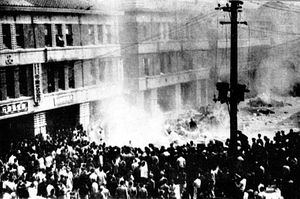Almost 70 years ago, a Taiwanese widow stood up against officers of the Kuomintang (KMT) government’s tobacco monopoly bureau when they were confiscating her black market cigarettes. Officers shot into a crowd of bystanders when they jumped to her aid, and killed one.
That unleashed the wrath of the Taiwanese, who were unhappy with widespread suppression by and malfeasance of the newly arrived KMT rulers. Chiang Kai-shek launched a crackdown on February 28, 1947 that lasted for weeks and saw up to 28,000 civilian casualties (although the official number has not been confirmed). The 228 Incident, referring to February 28, was the prelude to the era of White Terror from 1949 until martial law lifted in 1987, when dissidents and intellectuals were imprisoned or executed to assert KMT rule over the island.
On Sunday, Taiwan commemorated the 69th anniversary of the darkest page in its modern history. Political leaders paid tribute to victims of the incident at memorial parks in Taipei and elsewhere. Outgoing president Ma Ying-jeou, of the KMT, urged the public to never forget the 228 Incident, but also reminded Taiwanese that his party had publicly apologized to the victims in 1995 and built several memorial parks and museums.
But the wounds still run deep. For Taipei mayor Ko Wen-je it was also a personal affair, as his grandfather died from injuries sustained during the uprising. His tear-filled commemoration speech, delivered after a 520 km-long bike ride in remembrance of his late grandfather, was widely shared on social media.
Though Chiang Kai-shek, widely believed responsible for the 228 Incident, has been placed on actual pedestals across the country, his image is not so much that of a revered leader but rather of a dictator – his statues are repeatedly defaced, like last weekend, with slogans such as “Taiwan’s Hitler.” A video in which students at the National Chengchi University, originally the KMT party school, were being stopped from posting leaflets protesting against the 228 Incident went viral on social media on Friday.
The landslide victory in the January elections for current president-elect Tsai Ing-wen and her liberal Democratic Progressive Party (DPP), established as an opposition party shortly after martial law was lifted, has not only marked a fundamental shift for Taiwan’s future policies – it may also be significant for reconciliation with its past.
Tsai Ing-wen, leading the first parliament not ruled by the KMT, said during the memorial service on Sunday that she would deliver on her promise to focus on truth and reconciliation. “On the same day last year, I was here pledging that, if elected president, I would put an end to history’s mistakes and transform Taiwan into a nation with real freedom and democracy,” she reportedly said.
When native Taiwanese and KMT chairman Lee Teng-hui became president, he broke the taboo around the 228 Incident and commissioned a government-financed report that indirectly held Chiang Kai-shek responsible for the violence – but it did not lead to an official statement of accountability.
Tsai Ing-wen’s focus on transitional justice is clearly directed at the KMT – as it is the first time they are out of power both in parliament and the presidential seat.
A special taskforce focused on transitional justice has been set up, led by the chairman of the new activist New Power Party’s Freddy Lim. The taskforce, among other things, will mostly focus on the KMT’s “ill-gotten” party assets, which they accumulated as the authoritarian ruler seized land and collected monopoly rents, as the Tobacco Monopoly that ignited the 228 Incident. It is often said in Taiwan that KMT is one of the world’s richest political parties, but that’s a point of criticism, as it is seen as the KMT benefits from a legacy of dictatorship and one-party rule.
The current public debates all focus on the role of the KMT in Taiwan’s national history, a quest for a pro-Taiwan identity and national Taiwanese history. The newly elected parliament last week fiercely debated whether KMT founder Sun Yat-sen, who died in 1925, should be considered Taiwan’s founding father after DPP legislator Kao Jyh-peng suggested that the ceremonial bowing to and display of the portrait of Sun Yat-sen in public places be scrapped. The legislative proposal was returned to the Procedure Committee on Friday.
It is not hard to see why the KMT is not pleased by Tsai’s promise to investigate; they accused Tsai Ing-wen of exploiting the 228 Incident for political purposes. “The DPP should not use 228 as a political ATM,” said KMT Chairwoman Huang Min-hui in a Facebook post.

































